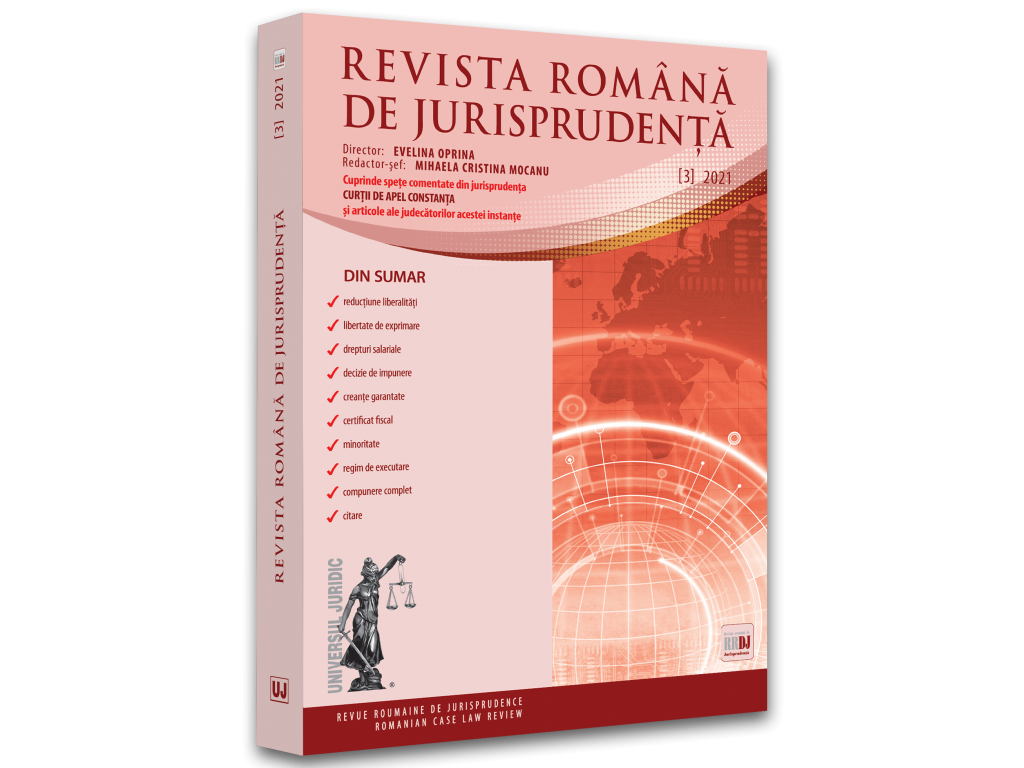Possibility of reducing the amount of the pension following a request for recalculation
DREPTUL MUNCII ŞI ASIGURĂRILOR SOCIALE
Abstract
Once a final judgment has been given, its enforcement can no longer be made subject to any conditions (respect for the interests of the plaintiff, safeguarding of rights earned, etc.). This condition for the exercise of the civil action (interest) has been analysed by the court which issued the enforceable title and, therefore, enforcement must be exclusively circumscribed by the provisions of the enforceable title, without imposing other conditions extrinsic to this act, left to the discretion of the debtor of the obligation, likely to seriously prejudice the authority of the res judicata.
On the other hand, the obligation to maintain the higher amount of the pension in payment can only derive from the law. In this regard, such legal provisions have been enacted, in the case of Article 111 of Law no. 223/2015 on state military pensions or Article 169 para. (5) and art. 1691 para. (4) of Law no. 263/2010 on the unified public pension system. Therefore, whenever the legislator has intended to grant such facilities in the case of recalculations ordered by law, express provisions have been adopted. Per a contrario, for the other situations there is no longer an obligation to keep the higher amount in payment.
In the latter case we also find ourselves in the present situation, in which the claimant requested the recalculation of his pension on the basis of the provisions of Article 107 of Law No 263/2010 on the unitary public pension system, on the basis of a new certificate containing his gross salaries earned. The statement of claim was admitted as submitted and the defendant was ordered by final judgment to issue the recalculation decision on the basis of that income. As a result of the recalculation, with earnings apparently worth more than those already taken into account when calculating the pension, the score decreased and the amount of the pension decreased accordingly. It is certain in these circumstances that in reality the income previously assessed (apparently lower) was wrongly deducted and led to the establishment of an undue amount of pension. This could be the result of wrong amounts in the workbook/previous statements, wrong percentages of salary increases applied to tariff salaries, contradictory statements, overlapping or double counting of salary elements, the variety of situations could be endless. It is thus unequivocal that there was a previous error in the calculation of the pension granted, which was revealed when the gross monthly salary values were entered into the system (the maximum value that was earned). Certainly, this error could also have been rectified in an ex officio review procedure permitted by law, but there is nothing to prevent the defendant from recalculating those calculations on the occasion of the present recalculation, which is the result of the enforcement of a judgment.
An additional argument lies precisely in compliance with the principle of contributory contributions invoked by the appellant-claimant, according to which social security funds are constituted on the basis of contributions payable by natural and legal persons participating in the system. That means that the pension beneficiary must benefit only to the extent of his contribution, through the actual recovery of all the income which formed the basis for the calculation of the social security contribution, according to the documents issued in accordance with the law (employment record book or certificates) by the former employers. However, if the retiree has contributed only to gross earnings, on the basis of payments made by the employer in accordance with the law, it is fair that he should receive the legally due pension, not one increased as a result of calculation errors of any kind.
Therefore, in the absence of express legal provisions, that protect retirees with recalculated pensions from the possible consequences of a decrease in the amount of the pension in payment as a result of their own requests for recalculation, the court cannot grant rights outside the law, its role being to interpret and apply the law, not to create new legal rules.








